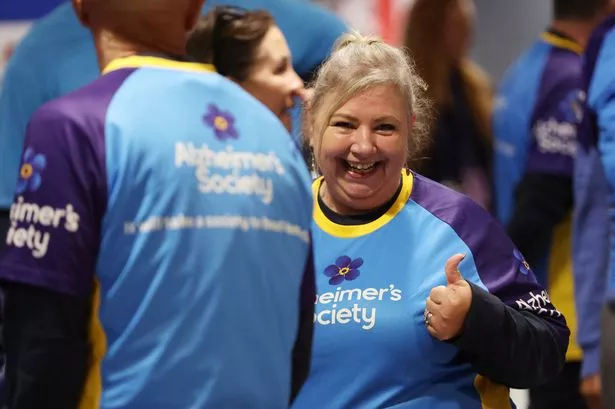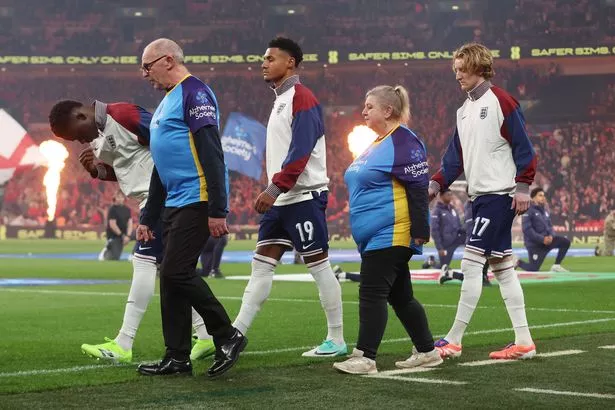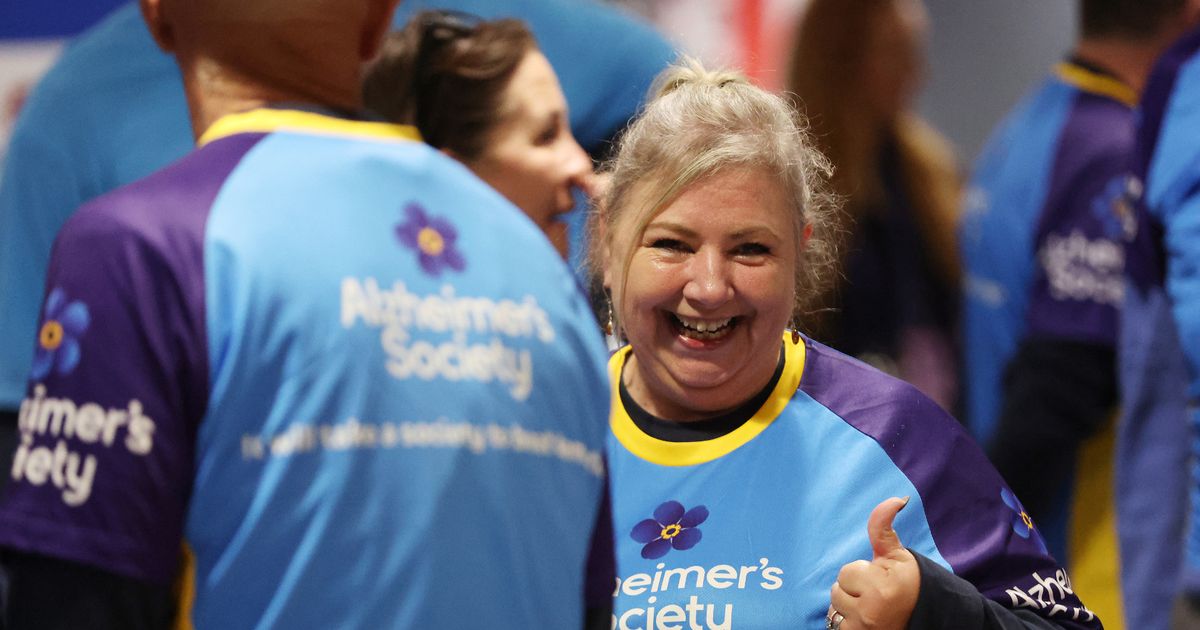Anita Goundry had a very special moment on the hallowed Wembley turf on Thursday evening
20:03, 10 Oct 2025Updated 20:16, 10 Oct 2025
 Anita Goundry – who walked out at Wembley with NUFC star Anthony Gordon(Image: Alzheimer’s Society)
Anita Goundry – who walked out at Wembley with NUFC star Anthony Gordon(Image: Alzheimer’s Society)
A die-hard football fan who follows Spennymoor Town home and away travelled further than usual on Thursday – to walk out alongside Newcastle United and England star Anthony Gordon as a mascot at Wembley. That’s because Anita Goundary, 56, lives with early-onset dementia.
As part of an initiative by the Alzheimer’s Society charity in partnership with the FA, the usual young mascots seen at football games were swapped for people living with the devastating illness. Speaking to ChronicleLive afterwards, former pub landlady and social worker Anita said it had been the most amazing experience.
She said: “Last night was just amazing. We had a bit of a nightmare getting there – took a wrong turn and were about an hour later than we should have been – but that didn’t matter a bit in the end.
“Getting into the tunnel, waiting for the players, well it was amazing. The atmosphere just built and built and it was so exciting. When the players came and stood with us it was really amazing – I didn’t realise quite how tall Dan Burn would be!
“I got to walk out with Anthony Gordon – just amazing. Then I was standing there singing the anthem – though I got it wrong, as I’ve been so using to singing God Save the Queen for so many years! We were all saying how the experience really blew us away.”
 Anita Goundry walking out at Wembley with NUFC and England star Anthony Gordon(Image: Alzheimer’s Society)
Anita Goundry walking out at Wembley with NUFC and England star Anthony Gordon(Image: Alzheimer’s Society)
A huge football fan since childhood, Anita supports Spennymoor Town, along with Newcastle United. She was brought up going to Spennymoor games – and when returning to the North East during Covid-19, she and husband Gary got back into the swing of things and picked up season tickets.
She said: “I have been watching football at Spennymoor since well back in the day – since I was seven. I would go with my dad every Saturday, that was our thing.
“I started with dementia symptoms when I was about 44 – but wasn’t diagnosed until 50. They kept putting it down to menopause, stress or depression. Of course, those symptoms were because of the dementia. They would say it couldn’t be this, that I was too young. In the end, I was told over the phone by a receptionist – awful. You wouldn’t tell someone about cancer like that.
Our ChronicleLive Daily newsletter is free. You can sign up to receive it here. It will keep you up to date with all the latest breaking news and top stories from the North East.
“Dementia is just brushed under the carpet – but it’s our biggest killer. And that’s why I have campaigned with the Alzheimer’s Society for better recognition of young-onset dementia.”
Anita even helps medical professionals with training about the condition during their degree courses – “Medical students can get just half a day of dementia training during their courses – and to think it’s so common among us….”
Previously Anita has spoken, as reported in the Mirror, about the difficulties of living with early-onset dementia and Alzheimer’s – and said one of the tough things is challenging the stereotypes.
She said: “Every single time I tell people that I have Alzheimer’s disease and vascular dementia they say, “But you’re far too young – are you sure that you have it?!” I was in my early fifties when I was diagnosed, but even now people will tell me that they don’t think I have the disease because I don’t fit the “stereotype”.”
The England versus Wales match at Wembley saw 22 people – including Anita – who are big football fans join their heroes on the pitch and in the tunnel. The match has been designated as the Alzheimer’s Society International, the fourth edition since the partnership between the charity and the Football Association began in 2021.
The 22 adults were nominated from across England and Wales to represent the different types of dementia – which is an umbrella term for a number of illnesses associated with an ongoing decline in brain function – and they replaced the traditional child mascots. The mascots also stood beside the players during the national anthems and received a warm reception from the sold-out Wembley crowd.
In keeping with previous Alzheimer’s Society Internationals, the players wore shirts without names on the back during the second half to highlight memory loss, a key symptom of dementia. England boss Thomas Tuchel is glad the spotlight will be shone on a subject which affects so many people.
“We’re so happy that we can raise a subject like this and bring it into the spotlight,” he said before the game. “I think this is only a positive thing that we can do as a national team and I know that the players are happy to contribute to such actions.
“It makes you aware how lucky we are and how privileged we are and makes us just very, very grateful. So, the best wishes and full support goes out to everyone who is affected, to all the families who are affected and stay strong, please.”
ChronicleLive has created a dedicated WhatsApp community for breaking news and our biggest stories. You can join this WhatsApp community here. It will keep you up-to-date with news as it breaks and our top stories of the day sent directly to your phone.

